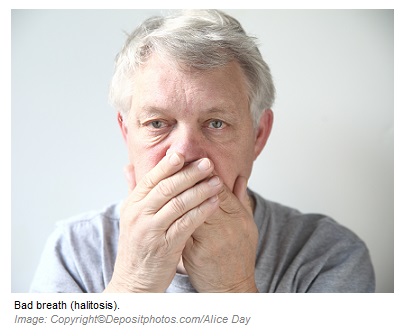Halitosis is a persistent and unpleasant odor of the breath. It affects up to 65% of
 people and is due to the production of sulfur gas by bacteria in the gastrointestinal system.
people and is due to the production of sulfur gas by bacteria in the gastrointestinal system.
Potential factors for developing halitosis:
- Poor oral hygiene (about 90% cases of halitosis originate from oral cavity).
- Poor digestion.
- Infections of the sinuses.
- Infections of the airway tracts and lungs.
- Constipation.
- Smoking.
- Cancers.
- Diabetes.
- Liver and Kidney diseases.
- Gastrointestinal acid reflux (GERD).
- Reduced saliva flow:
- Medications: antihistamines, anticholinergics, and diuretics.
- Radiation therapy.
- Dehydration.
- Sjogren syndrome.
- Dietary factors:
- Diets high in protein.
- Spicy foods.
- Fasting.
- Ketogenic diet.
Nutritional Supports:
Restricted Foods:
- Saturated fats.
- Fried foods.
- Processed foods.
- Dairy products.
- Chocolate.
- Sugars and sweets.
- Cured meats.
- Banana.
- Garlic.
- Onion.
- Alcohol.
- Carbonated beverages.
- Caffeinated drinks.
Recommended Foods:
- Water: a glass of water every 2 hours, at least 2 liters a day. Dehydration may aggravate halitosis.
- Whole grains.
- Legumes.
- Nuts.
- Fresh fruits and vegetables.
- Fruits high in volatile oils: guava, grapefruit, lemon, lime, orange, and tangerine.
- Vegetables high in volatile oils: basil, celery, coriander, parsley, peppermint, and spearmint.
- Vegetables high in chlorophyll: parsley, alfalfa, fenugreek, and watercress. Parsley contains both chlorophyll and volatile oils and is a traditional breath refresher.
- Pineapple.
- Ginger.
- Green tea.
- Peppermint tea.
- Spearmint tea.
Recommended Supplements:
- Parsley Extract: 5 – 10 drops after each meal, or as instructed on the label.
- Liquid Chlorophyll: 1 teaspoon in ½ glass of water after each meal.
- Co – Enzyme Q10: 200 – 300 mg a day (in people with diseases of the mouth and gum).
- Digestive Enzymes: A full spectrum product.
- Probiotics: a product that provides minimum 5 to 10 billion organisms per serving.
- Xylitol: 5 – 15 grams a day. It is a “tooth-friendly”, non-fermentable sugar alcohol that is added to chewing gums and toothpastes as a sweetener. It prevents the bacteria from sticking to the digestive systems.
- Curcumin: 1000 – 1500 mg a day. It is a potent antioxidant that helps the liver to detoxify toxins and waste products.
- Vitamin C: 2000 – 3000 mg a day.
- Milk Thistle Extract (containing 80% silymarin): 600 – 900 mg a day. It has a liver detoxifying effect.
- Caraway: as a tea, 3 times a day, or as a tincture, 2 – 8 ml a day. Caraway contains the volatile oils limonene and carvone. Volatile oils deodorize the bad odors.
- Thyme: as a tea, 3 – 4 times a day, or as a tincture, 5 – 10 ml a day. The active ingredients in thyme are volatile oils (thymol, carvacol, and phenols).
- Vitamin B – Complex: A high potency product.
Miscellaneous Suggestions:
- Liver detoxification.
- Colon cleansing.
- Brushing the teeth with baking soda.
- Mouthwash with diluted apple cider vinegar.
- Gargling with tea tree oil.
- Cessation of smoking.

